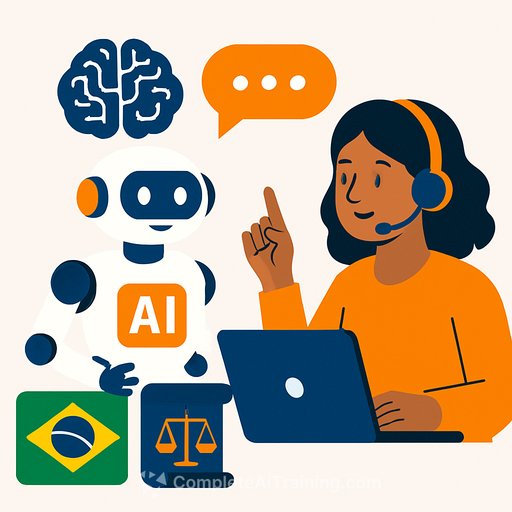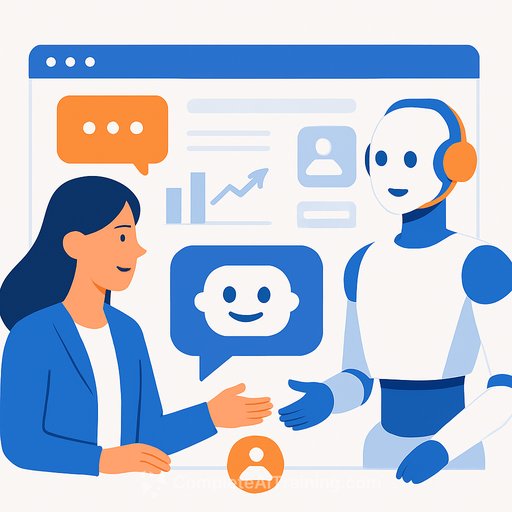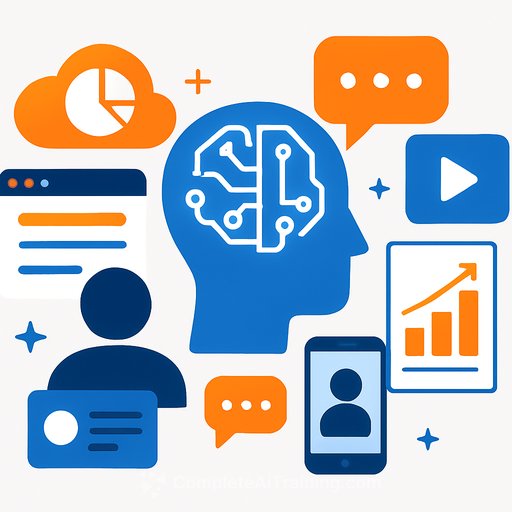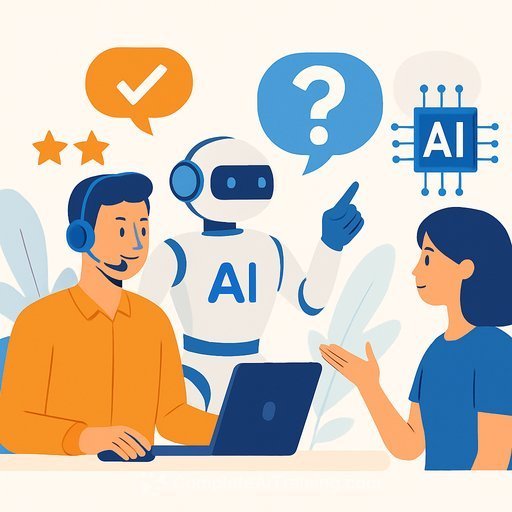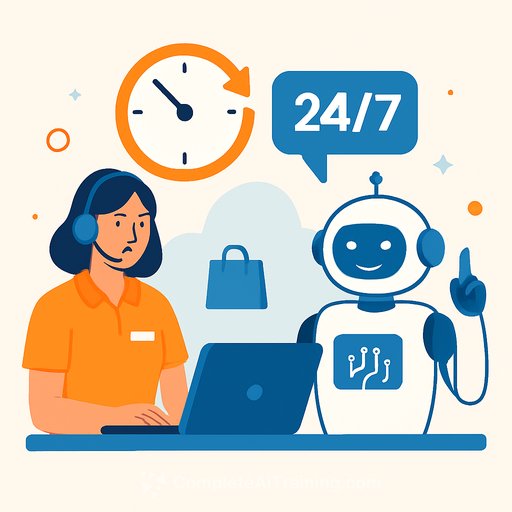The Complete Guide to Using AI as a Customer Service Professional in Brazil in 2025
Too Long; Didn't Read:
In Brazil 2025, AI is reshaping customer service. Chatbots handle 56% of cases, generative AI boosts productivity, and 68% of professionals use AI daily — but only 31% receive formal training. Compliance with LGPD, Bill 2,338/2023, and data protection rules is essential, with fines up to BRL 50 million and a projected BRL 13 billion investment in AI.
For customer service professionals, AI is a practical tool transforming daily tasks. Chatbots lead adoption, generative AI enhances agent productivity and marketing automation, shifting focus from routine tickets to high-value interactions. Teams skilled in supervision, prompt design, and model checks will set the pace. Meanwhile, privacy laws and human oversight remain critical.
Upskilling is key. Courses like the 15-week AI Essentials for Work teach how to use AI tools and write effective prompts, helping agents improve customer outcomes.
How AI is Used in Brazil: Common Customer Service Use Cases in 2025
Customer service blends smart automation with human judgment. Chatbots top the list at 56% of use cases, followed by generative AI for marketing content (50%) and personalized experiences (36%). Enterprise Copilots and conversational AI offer Portuguese-speaking customers natural, 24/7 support across channels.
Local momentum around Microsoft’s cloud and Copilot is strong, with expanded data centers and solutions tailored to Brazilian Portuguese and compliance needs.
- Customer service via chatbots: 56%
- Creating marketing content: 50%
- Personalizing customer experience: 36%
- Professionals using AI daily: 68%
- Professionals with formal AI training at work: 31%
What Is the New AI Law in Brazil? Bill No. 2,338/2023, LGPD and Regulator Roles
Bill No. 2,338/2023 passed the Federal Senate on December 10, 2024. It awaits review by the Chamber of Deputies and presidential sanction. The law uses a risk-based approach, banning “excessive-risk” AI uses and requiring governance, transparency, and impact assessments for high-risk systems.
The National Data Protection Authority (ANPD) will coordinate the National System for AI Regulation alongside sector agencies. The law closely aligns with the LGPD, emphasizing data protection, DPIAs, and rights like explanation, contestability, and human review.
- Status: Senate approved; pending further legislative steps
- Approach: Risk-based classification of AI uses
- Regulator: ANPD coordinating AI governance
- Obligations: Risk classification, algorithmic impact assessments, transparency, governance
- Penalties: Up to BRL 50 million or 2% of turnover; suspension or prohibition of AI systems
Regulatory and Legal Musts for Brazilian Customer Service Teams
Privacy and compliance are core responsibilities. The LGPD empowers ANPD to require Data Protection Impact Assessments (DPIAs) outlining data handling, security measures, and risk mitigation.
Customer rights include quick access, correction, deletion, and review of automated decisions. Any AI used for routing, scoring, or replies needs transparent logs and clear escalation paths. Incident notification to ANPD and affected users is mandatory.
Teams should map data flows, embed DPIA workflows, include vendor clauses in contracts, train frontline staff on data requests, and apply ANPD guidance to ensure privacy by design.
Operational Best Practices for Customer Service Teams in Brazil
Focus on omnichannel design with seamless handoffs and strong local language support. Use a unified CRM and design system so every agent gets the same context across devices and channels.
Build device-aware customer flows to avoid repetition. Localize copy and interface so Portuguese feels natural. Combine real-time AI agent assist with microlearning to catch errors and run DPIA-friendly checks.
Use clear handoff scripts, ‘save as draft’ baskets, and regular cross-team reviews to reduce friction and design debt in workflows.
Which Is the Best AI Chatbot for Customer Service in Brazil in 2025?
Choose chatbots that natively support Brazilian Portuguese and integrate with contact centers. They must provide clear logging and DPIA-ready documentation, plus human override when outputs seem uncertain.
Popular models like OpenAI’s ChatGPT and Google’s Gemini are common, but popularity doesn’t guarantee compliance. Transparency, necessity, and proper pre-processing are essential per ANPD guidance.
Compliance, Procurement and Contract Clauses for AI Vendors in Brazil
Contracts must ensure lawful data use, data provenance, and vendor indemnities. Customers should require SLAs, accuracy targets, human-in-the-loop controls, and audit rights.
Important clauses include documentation of model logic, automatic algorithmic logging, incident notification, cybersecurity commitments, and clear intellectual property and post-termination rules.
Implementation Roadmap for Brazilian Customer Service Teams
Start small with a compliance-first approach. Begin with readiness assessments and use-case prioritization. Then move to pilot deployments, data governance, and finally scale with MLOps and training.
Focus pilots on high-value, low-complexity cases to prove value quickly. Embed LGPD and DPIA checks throughout, secure vendor contracts with logging and standard contractual clauses (SCCs), and maintain quick feedback loops for monitoring and retraining.
- Strategic Alignment & Discovery (2–3 months): Readiness assessment, prioritizing use cases
- Infrastructure & Data Strategy (3–6 months): Design cloud/hybrid stacks, data pipelines, LGPD compliance
- Pilot & Model Development (3–9 months): Build prototypes, conduct DPIAs and bias tests
- Deployment & MLOps (3–4 months): Set up CI/CD, monitoring, drift detection, incident workflows
- Scale & Governance (Ongoing): Training, vendor audits, continuous optimization
Metrics, Monitoring and Risk Mitigation for AI in Brazil
Focus on KPIs tied to business outcomes to demonstrate AI’s value. Use algorithmic logging, drift detection, prompt and audit trails, and rapid incident response workflows.
Collect in-app feedback and agent validations, prioritize response speed and accuracy, and ensure smooth escalation and transfer rules.
Conclusion: Will AI Take Over Jobs? The Future for Customer Service Professionals in Brazil
AI will transform customer service roles rather than eliminate them. A June 2025 study estimated generative AI could impact 31.3 million Brazilian workers, changing many clerical and contact center tasks.
Brazilians already use AI extensively—68% daily—but only 31% have formal training. The practical approach is to use AI as a co-pilot: automate routing and summaries but keep agents for empathy, judgment, and complex cases.
Frequently Asked Questions
What are the common AI use cases and key adoption stats for customer service in Brazil in 2025?
Chatbots handle 56% of cases, generative AI creates marketing content for 50%, and personalized experiences reach 36%. 68% of professionals use AI daily but only 31% receive formal training.
What does the new AI law (Bill No. 2,338/2023) and the LGPD require for AI deployments?
The law bans excessive-risk AI uses and requires transparency, governance, and impact assessments for high-risk systems. It also defines roles and responsibilities for developers and operators.
What operational and compliance measures should customer service teams implement before deploying AI?
Map data flows, embed DPIAs in pilots and procurement, keep records and logs, implement security and governance measures, and define human-in-the-loop escalation and explanation processes.
How should teams choose and contract AI vendors?
Pick vendors supporting Brazilian Portuguese with contact center integration, DPIA-ready documentation, logging, audit trails, and human override capabilities.
Will AI take customer service jobs and how can professionals prepare?
AI will change roles rather than replace them. Professionals should see AI as a co-pilot and invest in focused upskilling to stay relevant.
For practical AI training resources tailored to customer service roles, explore options at Complete AI Training.
Your membership also unlocks:

